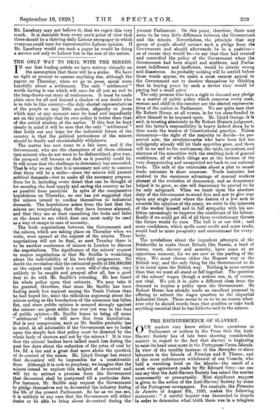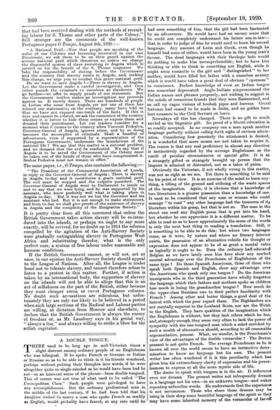THE RECRUDESCENCE OF SLAVERY.
OUR readers may know either from questions in Parliament or notices in the Press that the Anti- Slavery Society has of late been showing considerable anxiety in regard to the fact that slavery is beginning to raise its head once more in the Portuguese Cocoa Islands. jrt view of the terrible increase of the Servicaes or slave labourers in the Islands of Principe and S. Thome, and of the most unfortunate withdrawal of our Consuls, who held a watching brief on the islands—the result of a most wise agreement made by Sir Edward Grey—no one can say that the Anti-Slavery Society has raised the matter unnecessarily or prematurely. Most significant support is given to the action of the Anti-Slavery Society by some of the Portuguese newspapers. For example, the Primeiro de Janeiro of August 6th, 1920, makes the following statement : " A careful inquiry was demanded in Angola in order to determine what truth there was in a telegram that had been received dealing with the methods of recruit- ing labour for S. Thome and other parts of the Colony." Still stronger are the comments of the well-known Portuguese paper 0 Tempo, August 4th, 1920 :- " A National Peril.—Now that people are speaking of the value of our Colonies and becoming interested in our vast Dominions, we ask them to be on their guard against the serious national peril which threatens us unless we change the disgraceful system of slave recruiting in Angola which is carried on for the benefit of the S. Thome magnates. We 'take the responsibility of stating before the Government and the country that slavery exists in Angola, and, making this charge, we urge you to combat this grave national peril. Do we want to save Angola ?—There is slavery in Angola. Let the Government make a careful investigation, and then either punish the criminals or ourselves as slanderers. We go further—we offer to supply proofs of our statement. But the Government neither makes an investigation nor proceeds against us. It merely denies. There are hundreds of people in Lisbon who come from Angola, yet not one of them has refuted our statements; on the contrary, many have told us that we have not exposed one-tenth of the facts. If this is true and cannot be refuted, we ask the conscience of the country whether it is better to hide these crimes or expose them and demand their punishment. Let our readers consider for a moment what it means to the country when Viscount Pedralva, Governor-General of Angola, ignores crime, and by so doing becomes the accomplice of criminals. Shall a handful of adventurers, oven if supported by a representative of the Portuguese Government, undermine the foundations of the national life ? We say that this matter is a national problem, and we demand that the evil be eradicated. We say that if Angola is to be saved the Government of the Colony must be taken out of the hands of those who have compromised it. Senhor Pedralva must not remain in office."
The same paper, i.e., 0 Tempo, also contains the following :- " The President of the Commercial Association of Lunda, in reply to the Governor-General of Angola : There is slavery in Angola to-day and it constitutes a grave national peril. The evil must be stopped and the culprits punished. The Governor-General of Angola wont to Parliament to insult us and to say that we were lying, and he was supported by his assistant, who know perfectly well what is taking place in Angola to-day. But it was not we but the Governor and his assistant who lied. But it is not enough to make statements, and from to-day we shall give proofs of the existence of slavery in Angola and the complicity of the Emigration Society."
It is pretty clear from all this comment that unless the British Government takes action slavery will be re-intro- duced into the islands, or perhaps we ought to say more exactly, will be revived, for no doubt up to 1914 the reforms compelled by the agitation of the Anti-Slavery Society were gradually extinguishing slavery in Portuguese West Africa and substituting therefor, what is the only perfect cure, a system of free labour under reasonable and humane conditions.
If the British Government cannot, or will not, act at once, in our opinion the Anti-Slavery Society should appeal to the League of Nations. After all, the League is under bond not to tolerate slavery, and cannot therefore refuse to listen to a protest in this matter. Further, if action is taken by an international body, the supporters of slavery on the islands will not be able to allege that this is an act of selfishness on the part of the British, either because they want cheaper cocoa or covet Portuguese colonies. No doubt such accusations are ridiculous, but unfor- tunately they are only too likely to be believed in a period when such large sections of the Radical and Labour parties are willing, at dictation from Moscow and elsewhere, to declare that the British Government is always the enemy of freedom or, as Mr. Lansbury says in his genial way, " always a liar," and always willing to strike a blow for the selfish capitalist.







































 Previous page
Previous page